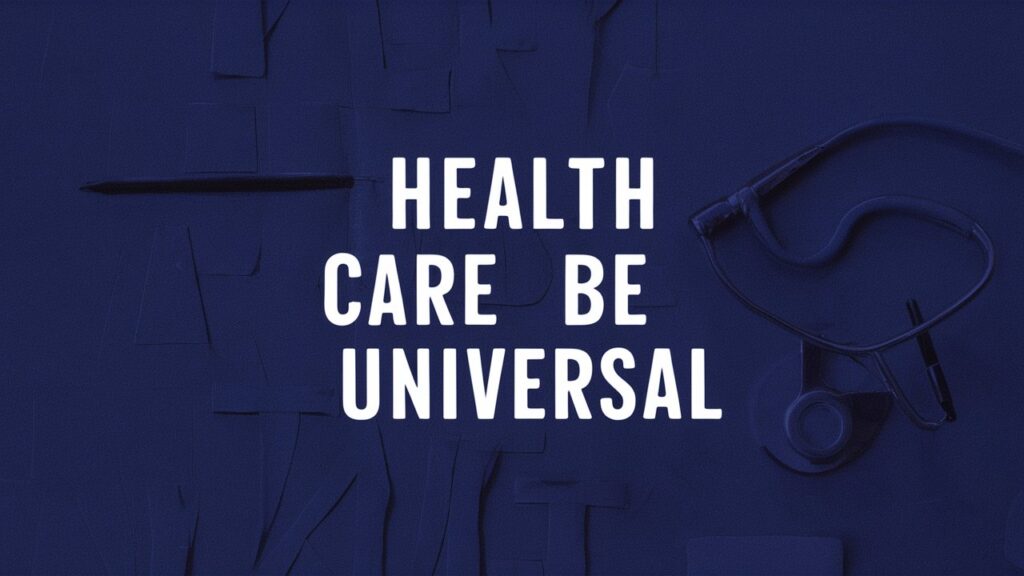Universal health care is a topic of significant relevance and importance in today’s global society. As we navigate through various health crises, the conversation around equitable access to medical services has gained momentum. Universal health care ensures that every individual receives necessary health services without suffering financial hardship. This concept is crucial for fostering healthy populations, promoting social equity, and ensuring economic stability.

Historical Context of Universal Health Care
Early Health Care Systems
Health care systems have evolved over centuries, with early forms of public health care appearing in ancient civilizations. The first organized efforts can be traced back to Ancient Greece and Rome, where public baths and medical services were available to citizens.
Development in the 20th Century
The concept of universal health care gained traction in the 20th century. Notable milestones include the establishment of the National Health Service (NHS) in the United Kingdom in 1948, which became a model for many other countries. The idea spread across Europe and other parts of the world, leading to various forms of publicly funded health care systems.
Modern Universal Health Care Models
Today, numerous countries have adopted universal health care systems, including Canada, Australia, and most European nations. These models vary but share a common goal: to provide comprehensive health coverage to all citizens.
Importance of Universal Health Care
Health Equity
Universal health care aims to eliminate disparities in health outcomes by providing equal access to medical services. This ensures that all individuals, regardless of socio-economic status, have the opportunity to receive timely and adequate health care.
Economic Benefits
Investing in universal health care can lead to significant economic benefits. Healthy populations are more productive, leading to economic growth. Moreover, universal health care can reduce overall health care costs by focusing on preventive care and reducing the reliance on emergency services.
Social Stability
Universal health care promotes social stability by reducing the burden of health care costs on individuals and families. It helps prevent medical bankruptcies and alleviates financial stress, contributing to overall societal well-being.
Types and Categories of Universal Health Care Systems
Single-Payer Systems
In single-payer systems, the government funds health care through taxation. Examples include the NHS in the UK and the Medicare system in Canada. These systems aim to provide comprehensive coverage to all citizens.
Multi-Payer Systems
Multi-payer systems involve multiple sources of funding, including private insurance companies and government programs. Germany and Japan are examples where both public and private insurance coexist to cover the population.
Hybrid Systems
Hybrid systems combine elements of both single-payer and multi-payer systems. For instance, France’s health care system includes mandatory health insurance funded by taxes and additional private insurance options.
Symptoms and Signs of Inadequate Health Care Access
Lack of Preventive Care
Inadequate access to health care often results in a lack of preventive services, leading to higher rates of chronic diseases and preventable illnesses.
Delayed Treatments
Delayed access to medical treatment can exacerbate health conditions, resulting in worse health outcomes and higher costs for emergency care.
Financial Hardship
Individuals without adequate health care coverage often face financial hardship due to high medical bills, leading to increased stress and reduced quality of life.
Causes and Risk Factors for Health Care Disparities
Socio-Economic Factors
Poverty, lack of education, and unemployment are significant risk factors contributing to health care disparities. Individuals in lower socio-economic groups are less likely to have access to quality health care.
Geographical Barriers
People living in rural or remote areas often face geographical barriers to accessing health care services, resulting in delayed or inadequate medical care.
Systemic Inequities
Systemic inequities, including racial and gender discrimination, can lead to disparities in health care access and outcomes. Minority groups often experience lower quality of care and poorer health outcomes.
Diagnosis and Tests in Universal Health Care Systems
Comprehensive Health Screenings
Universal health care systems emphasize comprehensive health screenings to detect diseases early and provide timely treatment.
Accessible Diagnostic Services
Providing accessible diagnostic services, such as imaging and laboratory tests, is a key component of universal health care. This ensures early detection and effective management of health conditions.
Continuous Monitoring
Continuous monitoring and follow-up care are essential for managing chronic diseases and preventing complications, which are integral aspects of universal health care systems.
Treatment Options in Universal Health Care
Primary Care Services
Universal health care systems prioritize primary care services, ensuring that all individuals have access to a primary care provider for regular check-ups and preventive care.
Specialized Medical Services
Access to specialized medical services, including surgery, oncology, and cardiology, is ensured in universal health care systems. This comprehensive approach addresses a wide range of health needs.
Mental Health Services
Mental health care is an integral part of universal health care, providing access to counseling, therapy, and psychiatric services to support mental well-being.
Preventive Measures in Universal Health Care
Vaccination Programs
Universal health care systems implement comprehensive vaccination programs to prevent the spread of infectious diseases and protect public health.
Health Education
Health education initiatives promote awareness about healthy lifestyles, disease prevention, and the importance of regular medical check-ups.
Early Intervention Programs
Early intervention programs target at-risk populations to provide timely support and prevent the progression of health issues.
Personal Stories or Case Studies
Real-Life Implications of Universal Health Care
Stories of individuals who have benefited from universal health care systems highlight the positive impact on their lives and health outcomes.
Case Study: The NHS Experience
A detailed case study of the NHS showcases how universal health care can improve public health, reduce costs, and promote social equity.
Testimonials from Health Care Beneficiaries
Testimonials from beneficiaries of universal health care systems provide personal insights into the benefits and challenges of such systems.
Expert Insights on Universal Health Care
Quotes from Medical Professionals
Medical professionals advocate for universal health care, emphasizing its importance for public health and economic stability.
Research Findings
Research studies demonstrate the effectiveness of universal health care in improving health outcomes and reducing disparities.
Policy Recommendations
Experts provide policy recommendations for implementing and improving universal health care systems based on successful models and research findings.
Challenges and Limitations of Universal Health Care
Funding and Resource Allocation
Securing adequate funding and efficiently allocating resources are significant challenges in maintaining universal health care systems.
Political and Economic Opposition
Political and economic opposition can hinder the implementation and sustainability of universal health care systems, requiring strong advocacy and public support.
Quality of Care
Ensuring high-quality care across all regions and populations remains a challenge, necessitating continuous monitoring and improvement efforts.
Latest Innovations in Universal Health Care
Technological Advancements
Technological advancements, such as telemedicine and electronic health records, enhance the efficiency and accessibility of universal health care systems.
Policy Innovations
Innovative policies, including value-based care and integrated care models, improve the effectiveness of universal health care.
Community Health Initiatives
Community health initiatives focus on local needs, promoting preventive care and improving health outcomes through targeted interventions.

Future Prospects of Universal Health Care
Expanding Coverage
Future efforts aim to expand coverage to all individuals, including marginalized and underserved populations, to ensure truly universal health care.
Sustainable Funding Models
Developing sustainable funding models is crucial for the long-term success of universal health care systems, balancing cost and quality of care.
Global Health Integration
Integrating universal health care with global health initiatives can address cross-border health challenges and promote worldwide health equity.
Comparative Analysis of Universal Health Care Systems
Comparing Single-Payer and Multi-Payer Systems
Analyzing the strengths and weaknesses of single-payer and multi-payer systems provides insights into their effectiveness and applicability in different contexts.
Lessons from Successful Models
Learning from successful models, such as those in Scandinavia and Canada, can guide the development and improvement of universal health care systems globally.
Adaptability to Different Countries
Assessing the adaptability of universal health care models to different countries and cultural contexts helps tailor systems to local needs and conditions.
Conclusion
Universal health care is a fundamental aspect of a fair and equitable society. It ensures that all individuals have access to necessary medical services without financial hardship, promoting health equity, economic stability, and social well-being. By learning from successful models, addressing challenges, and leveraging innovations, we can move towards a future where universal health care is a reality for all.
